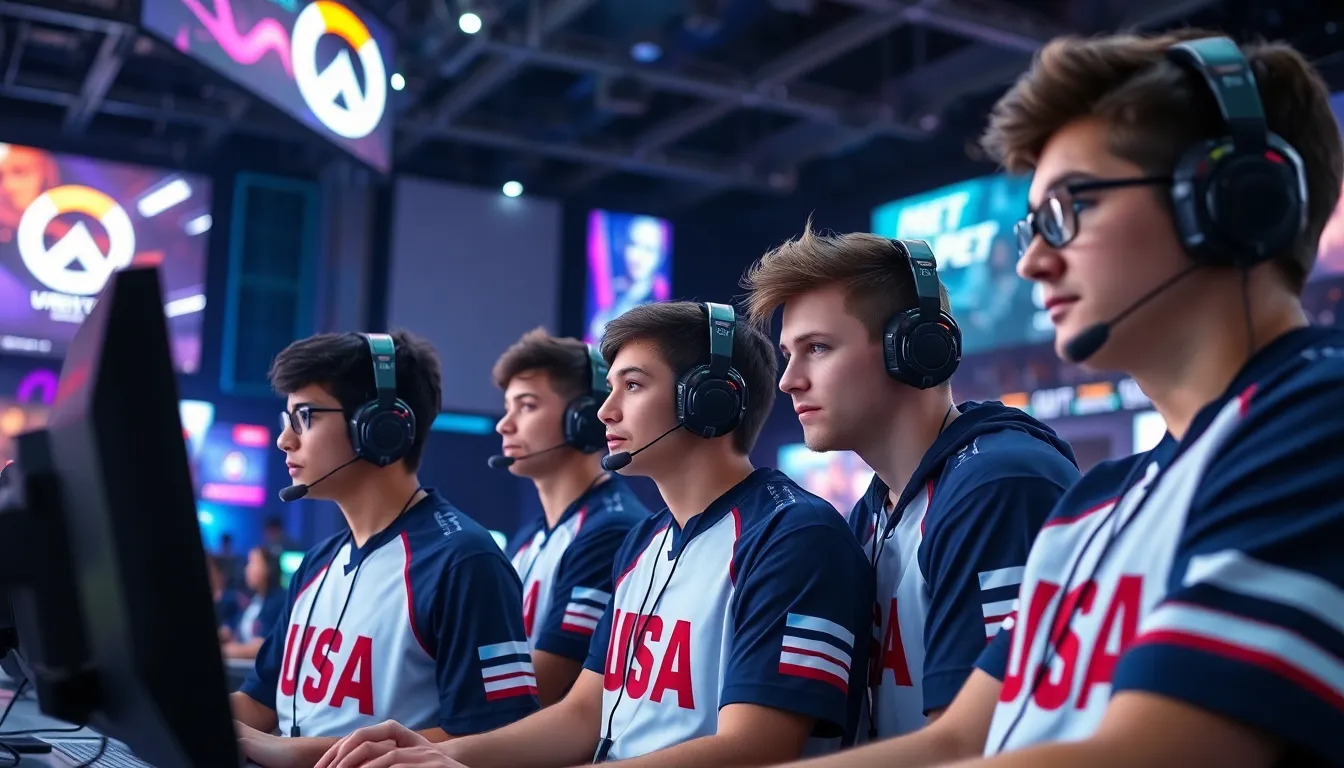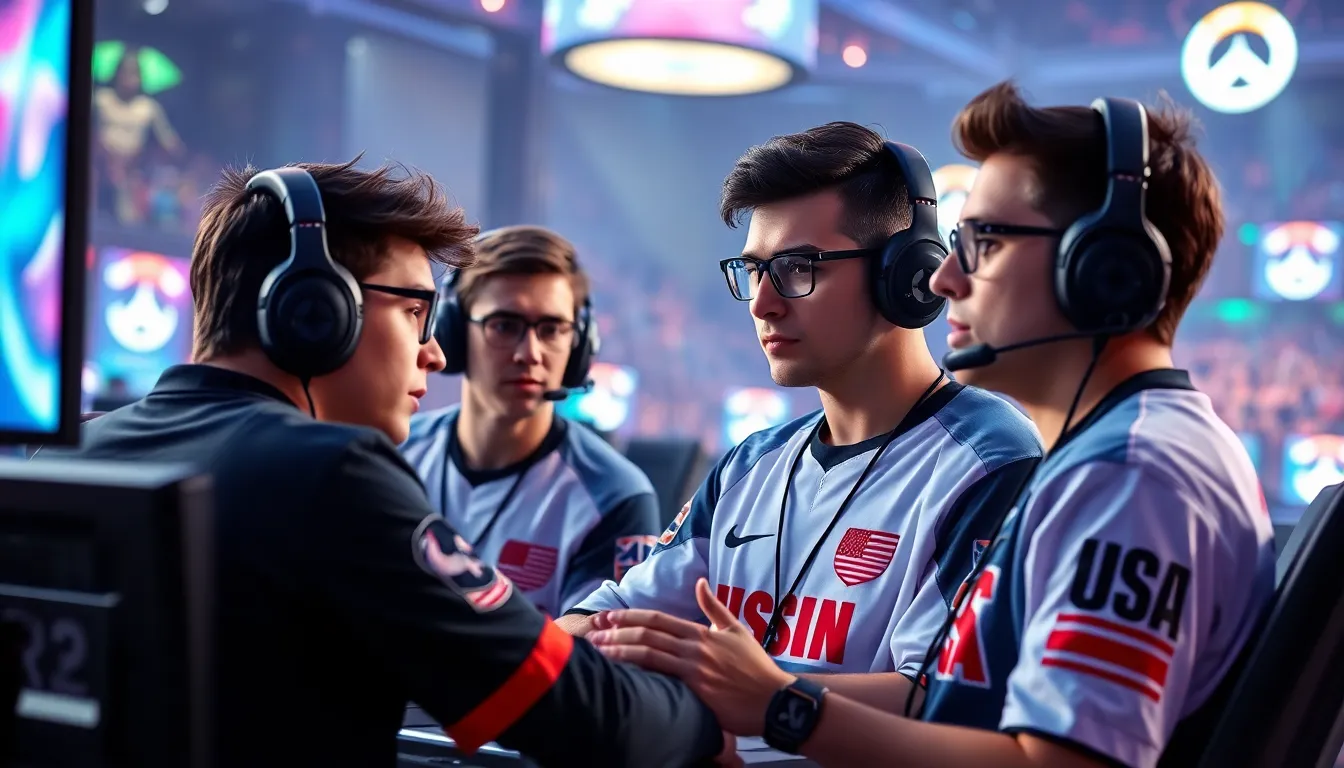Table of Contents
ToggleIn the fast-paced world of competitive gaming, the Overwatch Pro League stands out like a Tracer blink—quick, thrilling, and impossible to ignore. With teams battling it out for glory, fans are treated to high-stakes matches that could make even the most stoic gamer leap from their seat. Whether you’re a seasoned pro or just someone who thinks “Overwatch” is a new coffee blend, this league offers a spectacle that’s hard to resist.
Overview of Overwatch Pro League
The Overwatch Pro League represents a premier competitive platform for Overwatch esports. Launched in 2018, the league features teams from various global regions, including North America, Europe, and Asia. Competing in both regular season matches and playoffs, teams showcase their skills to gain championship titles and earn substantial prize pools.
Professional teams participate in a structured format, which includes a regular season followed by an extensive postseason. Each team competes in matches held weekly, allowing fans to witness skillful strategies and dynamic gameplay. Notably, team rosters generally consist of six players, emphasizing collaborative synergy and individual excellence.
Fans actively engage with the league through streaming platforms, allowing real-time interaction during matches. Significant viewership statistics demonstrate the league’s popularity, attracting millions of viewers globally. Events often sell out, reflecting passionate support from local communities.
Diverse team compositions and strategies make the Overwatch Pro League an evolving spectacle. Organizations invest heavily in talent development, recruiting skilled players through scouting and trials. Players require mastery of various heroes, fostering adaptability and teamwork.
The league also hosts annual events, such as the Grand Finals, celebrating the pinnacle of competition. The introduction of expansion teams has increased competitiveness and global representation, enhancing the overall appeal. Its thrilling nature continues to attract new and veteran fans alike, solidifying its position as an essential entity in the esports landscape.
Format and Structure

The Overwatch Pro League follows a structured format, providing clarity on how matches and seasons unfold.
Season Format
Each season consists of three stages, culminating in playoffs that determine championship contenders. Regular-season matches take place weekly, with each team playing multiple games against various opponents. Points accumulate through win-loss records, influencing playoff seeding. The playoff phase includes a double-elimination bracket, intensifying competition as teams battle for the title. Fans experience thrilling moments as teams display tactical mastery and adapt strategies in real-time.
Teams and Rosters
Six-player rosters form the backbone of each participating team, reinforcing collaboration and strategic depth. Teams hail from diverse regions, including North America, Europe, and Asia, fostering international rivalries. Organizations actively invest in talent through scouting and development programs, ensuring a pipeline of skilled players. Roster changes may occur during the off-season, enabling teams to adapt and refine their lineups. Moreover, players often specialize in various heroes, enhancing flexibility in gameplay styles and strategies.
Competitive Landscape
The Overwatch Pro League thrives on its dynamic and competitive atmosphere, showcasing top-tier talent across the globe.
Key Players to Watch
Notable players like JJoNak, Carpe, and Sparkle consistently make headlines with their exceptional skills. These individuals often shape the outcome of matches through individual brilliance and strategic gameplay. Their ability to adapt to various heroes enables teams to maximize performance and leverage unique strategies. Swapping heroes mid-game adds an element of unpredictability that keeps opponents on their toes. Talent scouting focuses on these standout players, highlighting the importance of their contributions to team dynamics and overall success within the league.
Strategies and Playstyles
Effective strategies focus on coordination and synergy, often determining match outcomes. Teams employ various playstyles, ranging from aggressive tactics to more defensive approaches. Communication plays a crucial role in executing complex strategies during high-pressure moments. Configuring team compositions based on map types also influences performance. Adapting to opponents’ strengths and weaknesses creates opportunities for victory. Many teams emphasize flexibility, adjusting plays throughout the match to counter rival strategies. Mastering hero combinations enhances team efficacy and drives exciting, unpredictable gameplay.
Community and Fan Engagement
The Overwatch Pro League actively engages fans through multiple channels. This interaction enhances the passion surrounding competitive gaming.
Streaming and Content Creation
Streaming platforms serve as a primary medium for fan engagement. Fans can watch live matches on platforms like Twitch and YouTube, often featuring commentators and analysts who break down strategies. Content creators produce highlight reels, analysis videos, and entertaining commentary, expanding the league’s visibility. In 2023, viewership numbers reached millions, reflecting widespread popularity. Teams also participate in creating engaging content, sharing behind-the-scenes videos and player interviews to foster connections with fans.
Merchandise and Events
Merchandise sales offer fans a way to support their favorite teams. Jerseys, hats, and other collectibles become increasingly popular during the season and especially around major events. Events like the Grand Finals draw large crowds, both in person and via live streams, creating an electric atmosphere for fans. Special offers and limited-edition items often accompany these events. Organizing meet-and-greets with players adds another layer of fan involvement, allowing direct interactions and fostering community spirit.
Challenges and Controversies
Various challenges have emerged within the Overwatch Pro League, impacting its growth and community perception. Player burnout has become a significant concern due to the demanding schedules and intense competition. Many players experience fatigue from the rigorous training schedules required to keep up with evolving strategies and gameplay.
Additionally, controversies surrounding player behavior often arise, reflecting on the league’s image. Instances of toxicity in communication can hinder team dynamics and discourage new entrants into the competitive scene. Organizations prioritize establishing a positive culture to mitigate this issue, promoting sportsmanship among players.
Another challenge involves balancing performance and individual player well-being. Several professional players have voiced concerns over mental health, emphasizing the necessity for support systems within teams. Teams increasingly recognize the importance of mental health initiatives to create a sustainable environment for their athletes.
The rising prominence of external factors impacts the league as well. Issues with cheating and match-fixing have surfaced, threatening the integrity of competitions. League organizers consistently work to implement strict regulations and maintain transparency to uphold fair play.
Financial pressures also affect team operations and player salaries. The competitive nature of esports leads to high expectations for financial returns, pushing organizations to make tough decisions regarding roster changes and sponsorship strategies. Awareness of these challenges informs how teams manage their resources and prepare for future seasons.
As the Overwatch Pro League evolves, it must address these challenges and controversies to enhance its credibility and maintain its position within the esports landscape.
Future of Overwatch Pro League
The Overwatch Pro League faces exciting developments that can shape its trajectory. Expansion teams are becoming increasingly vital, enhancing global representation and competition levels. Organizations invest heavily in talent development, ensuring young players receive adequate support and resources.
Fan engagement strategies continue to evolve, utilizing streaming platforms like Twitch and YouTube to deliver more interactive experiences. Such platforms provide real-time insights, allowing fans to engage intimately with their favorite teams and players. Merchandise sales also reflect this growing engagement, with fans eagerly purchasing jerseys and collectibles to show support.
Mental health initiatives are expected to gain further attention as teams recognize their importance in sustaining player well-being. Enhanced support systems, including counseling services and peer programs, promote healthier environments for athletes. Striking a balance between intense competition and mental health remains a priority among organizations.
As the league adapts to challenges like player burnout and toxicity, it prioritizes fostering a positive culture. Developing policies that encourage sportsmanship and community can significantly benefit the competitive landscape. Additionally, addressing concerns around cheating and match-fixing is essential for maintaining the integrity of matches.
Data indicates a rising viewership trend, further cementing the need for innovation within the league. Increasing engagement through community events and meet-and-greets enriches the overall fan experience, fostering loyalty and growth. As teams refine their strategies and rosters, the competitive nature of the league will likely intensify, keeping fans engaged and excited for what lies ahead.
The Overwatch Pro League continues to redefine the landscape of competitive gaming. With its thrilling matches and diverse team strategies, it captures the attention of fans worldwide. As the league evolves, the focus on player well-being and community engagement will enhance its appeal and sustainability.
The introduction of expansion teams and talent development initiatives is set to elevate competition levels further. Innovations in fan interaction through streaming platforms will keep audiences engaged and excited. As challenges arise, the league’s commitment to fostering a positive culture and maintaining integrity will be essential for its growth.
With its dynamic environment and passionate community, the Overwatch Pro League stands as a significant force in esports, promising an exciting future for players and fans alike.




